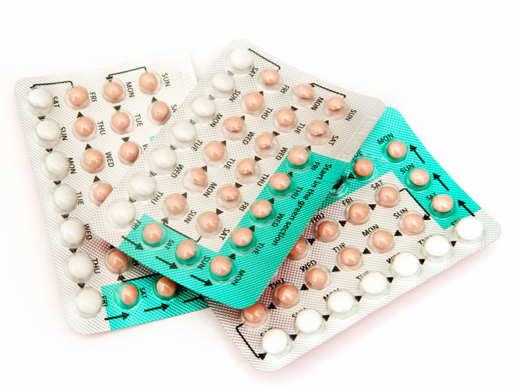Summary:
Combined hormonal birth control pills are a daily pill containing combined hormones (estrogen and progestin).
Effectiveness: approximately 91% effective in typical use (can be more effective if used correctly and consistently)
Price: Free for those with MSP and $15-$30 per month for those without
How do birth control pills work?
The pill uses two hormones – estrogen and progestin – to stop the ovaries from releasing an egg each month (ovulation) and to thicken the mucous in the cervix to block sperm.
How do you take the pill?
Take one pill at around the same time each day. Pick a time of day that is easy to remember. Keep the pills by your toothbrush, in your makeup bag, put a reminder on your phone or use an app to send text reminders.
Pills come in different packages with hormone and sometimes placebo or “sugar” pills. There is usually bleeding during the time you take placebo pills or if you take a break between packs, but it is not a true period. The bleeding comes from having a break from the hormone pills and is called a withdrawal bleed.
Using a 21-day pack: some packs have only 21 pills with hormones and no placebo pills.
- Conventional Use: This way usually means taking a7 day break each month to have bleeding. It is very important to never go more than 7 days without taking a hormone-containing pill. No matter what happens with bleeding, start the next pack on time.
- Shorter Breaks: Research shows that birth control pills are a bit more effective at preventing pregnancy with a shorter break. After finishing the pack of 21 hormone pills, take a 3-4 day break with no pills, and then start the next pack no matter what happens with bleeding. This may mean a shorter and/or lighter monthly bleed.
- Continuous Use: Not taking a break between packs is even more effective and for some it reduces side effects. Finish the 21-day pack and then start the next pack the next day with no break in between. There may not be a monthly bleed or it could be very light. This is safe. There may be spotting, especially after a few months.
Using a 28-day pack: Some packages of pills have 28 pills – 21 hormone pills and 7 placebo pills without hormones.
- Conventional Use: Taking all of the pills in a 28 day pack means there is a 7-day break from hormones each month with bleeding during the time of the placebo pills.
- Shorter Breaks: There is more protection from pregnancy if you take three or four days of the placebo pills, throw the rest away, and start the next pack (even if you are still bleeding or haven’t bled yet). This may mean a shorter and/or lighter monthly bleed.
- Continuous Use: The strongest protection against pregnancy is skipping the placebo pills and starting the next pack. This means you will not have a monthly bleed or it will be very light. This is safe. You may have some spotting, especially after a few months.
Using other kinds of packs: Some pills come with a different design. For example, Seasonale comes with 84 active pills and 7 placebo pills; Yaz and Yaz Plus have 24 active pills and 4 placebo pills; and Lolo has 24 active pills, two estrogen-only pills and two placebo pills. Take these pills as they are in the package.
When do you start your pills?
We recommend starting the pill on the day after an aspiration abortion or the day after using the misoprostol with a medication abortion. If you start at another time, the pill works right away if it is the first day of a period. On any other day, back up with condoms or don’t have intercourse until after taking the pill for 7 days.
What if you miss a pill?
Use a back-up birth control method like condoms if you: 1) take a pill more than 24 hours after your regular time 2) start a new pack of pills after more than a 7 day break 3) vomit within 1 hour of taking a pill or have severe vomiting or diarrhea for 2 days or more. It is safest to use condoms or do not have intercourse until you have taken 7 hormone pills in a row (which may mean skipping the break or placebo pills if a missed pill happens near the end of the pack). If you have had intercourse without a condom within the 5 days before a missed pill, consider using emergency contraception (Plan B, Ella or a Copper IUD – you can learn about these here).
Where can you get pills?
You need a prescription from a health care provider in order to get pills. You can get one from your family doctor or from a youth, sexual health, walk-in or women’s clinic. Once you have a prescription, you can buy the pills from a pharmacy. They are sometimes free at youth clinics or sold for less at clinics. To find a clinic, call the Sex Sense Line at 604-731-7803 (or toll free at 1-800-739-7367).
What kind of side effects can the pill have?
There can be positive side effects: monthly bleeding that is lighter and less painful, less acne. Most pill users do not have negative side effects. For those who do, the most common include nausea, breast tenderness, bloating, headaches, mood swings, dizziness, loss of sex drive and spotting/irregular bleeding. Side effects often lessen or go away after about 3 months, or may be improved by switching to a different pill. If you want to stop or switch your pills, talk to a healthcare provider first.
What are the risks of the pill?
The pill slightly increases the risk of blood clots (deep venous thrombosis, DVT). This is highest in the first 6-12 months of use and is much lower with pill use than it is with a full-term pregnancy. Discuss with your health care provider if you: have migraine headaches with visual symptoms (seeing an ‘aura’, spots or lights); have breast cancer (currently), impaired liver or kidney function, very high blood pressure, heart disease, a history of blood clots or clotting disorders, or lupus; have diabetes with nephropathy, retinopathy or neuropathy; are over the age of 35 and smoke cigarettes or have migraines; are breastfeeding; or have a family history of strokes and blood clots before age 50.
If you are having any of the following symptoms, seek medical attention immediately as they may be serious danger signs:
- A abdominal pain (severe) upper right side
- C chest or arm pain (severe), shortness of breath and/or coughing up blood
- H headaches, severe and not relieved by Aspirin or Tylenol, dizziness or numbness
- E eye problems such as blurred vision, flashing lights, double vision, blindness
- S swelling/redness, severe leg pain, speech problems
Frequently asked questions:
- Will the pill make me gain weight? Most people do not gain weight on the pill. When they do it is usually no more than 5 pounds and may be due to other causes. Some lose weight.
- Will the pill make it harder for me to have a baby in the future or cause birth defects? When you stop taking the pill your fertility returns very quickly. In fact, the pill can protect your fertility because it lowers the risk of getting a serious pelvic infection as well as endometrial and ovarian cancers. The pill does not cause birth defects even if taken while pregnant.
- Does the pill cause breast cancer? The pill does not increase your risk of getting breast cancer. However, if someone already has breast cancer they should not take it.
- Do I need to take a break from the pill? The pill is so safe that your body does not need a break from it. Going on and off birth control can increase side effects and the risk of pregnancy.
- Does the pill cause blood clots, heart attack or stroke? The pill does slightly increase these risks, but being pregnant and having a baby greatly increases this risk. If you have a higher risk of blood clots, heart attacks and strokes, talk to a doctor about whether other forms of birth control might be a better fit for you.
- Does the birth control pill protect me against sexually transmitted infections (STIs)? Using condoms with pills will provide you with protection against both pregnancy and STIs. It is also recommended to get tested regularly for STIs.
Questions? Contact the Sex Sense Line at 604-731-7308 (1-800-739-7367) or www.sexsense.org


